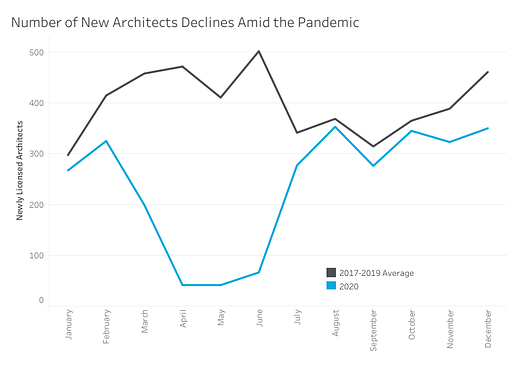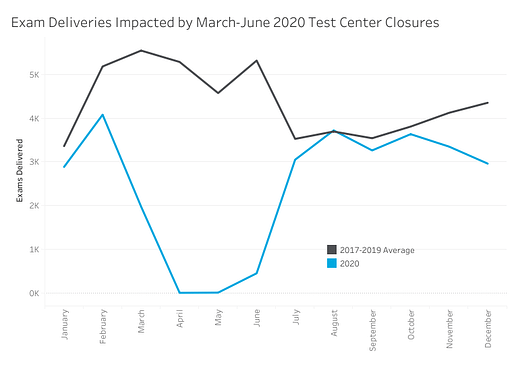
There was a 40% decrease in the number of newly licensed architects during 2020 relative to the previous three-year average, according to a report published today by the National Council of Architectural Registrations Board (NCARB). The statistic is one of many findings contained within the special report, which examined the impact of COVID-19 on architectural licensing and mobility across the United States between January and December of 2020.
According to the report, a combination of license test center closures, a transition to remote work, and a fluctuating, unpredictable demand for architectural services all impacted the career progress of licensure candidates in 2020. For instance, the delivery of Architect Registration Examinations (AREs) dropped by 44% last year, largely due to the closure of test centers between March and June.

The number of newly licensed architects dropped by 40% versus the previous three-year average, while just over 5,800 candidates began their licensure process by creating an NCARB Record; a 33% drop from the previous three-year average of 8,800. Meanwhile, approximately 25,000 candidates submitted Architectural Experience Program (AXP) reports in 2020; a 20% drop from the previous three-year average, due to increased unemployment and delays to architectural projects.
While the data presented in the NCARB report covers the entire year of 2020, metrics suggest that licensing mechanisms such as exam delivery, the number of new architects, and the number of candidates beginning the path to licensure all experienced major declines between February and April and, with a plateau between April and June, an increased surge from June through September.

Despite these large decreases, applications for reciprocal (out-of-state) licenses remained stable throughout 2020, with a decrease of only 3%. In addition, NCARB’s 2021 mid-year review suggests that the industry is on the path to recovery, with metrics such as NCARB Record applications, exam deliveries, and newly licensed architects all returning to, or exceeding, pre-pandemic levels.
“2020 was a challenging year for every industry, and architecture was no exception,” said NCARB CEO Michael Armstrong. “As we begin to turn the corner on the pandemic, we are seeing an upward trend that reflects a renewed national focus on infrastructure that protects the public’s health and wellbeing. This focus highlights the important role architects play. NCARB is excited to help support the pool of licensed talent, and foster this new period of growth for the field.”
The full NCARB report is available to read on the official website here.
15 Comments
PCR testing? what?
I would think that the unavailability of testing centers for the ARE would have a lot more to do with it.
This is correct.
Sure, PCR testing results may have affected some INDIVIDUALS but I think the shutdown of testing centers had more impact. I am not going to assume it was all but I do think even if they managed to get all their exams completed, the COVID-19 impacted in more ways than just the ARE Exam availability. It also impacted people in terms of jobs so they may have delayed filing the remaining paperwork and fees for completing the licensing. This would be a contributing factor that may make up some portion of the 40% decline in new licensees during 2020. I do think there may need to be more detail analysis on a state by state level and how it all factors. Just taking the exam and even if passing them doesn't always mean the person finishes the process of licensing. There is also states that allows a person to take the ARE without having all the AXP hours completed so they may still have to complete that and without work throughout much of 2020, they still have to finish up the rest of the hours. With more research, I think we'll get a more clear picture but I would say without going deep into research that the COVID pandemic is a key factor in the 40% reduction of new licensees in 2020. The closure of test facilities is a factor and I would say have more impact than the PCR tests. However, I would not say it is the number 1 reason without more accurate research. So I think the culmination of the various ways COVID pandemic has impacted the profession of architecture, work/employment, and so forth have been significant and some portion of the examinees have not completed all their AXP hours when taking the ARE and also got unemployed before all the AXP hours were completed. This would mean they won't get licensed until after they complete AXP which may require getting reemployed before they can finish that off.
For those of you who didn't see the original comments there was a person claiming that the PCR testing was the cause for lower number of architects.
Thank you for making clear there was a post (now deleted) from an idiot claiming that PCR testing was the cause for the lower number of new licensed architects in 2020.
How does this compare with the number of graduating arch students during that same time? I'd be curious to see both graphs.
I too would like to see data on this,
I think this, plus the next 2-3 years of data, will tell the story. It's way too early right now to say whether or not there'll be an uptick in registrations as the people who sat last year out get back on track. Or, conversely, if this will always be a small cohort (similar to the '08-'10 recession where many left the profession permanently).
I think there may be an uptick in new registrants but hard to say if raw statistic data collection will detect it based on how the data is collect and what data information is collected.
Coming next fall: Covid 21.
Because Covid 19 worked out so very well for the 1%.
Pencilgate/Online Proctoring + switch from Prometric to PCI (coming soon...) may also have a statistical impact from people who were/are waiting for the dust to settle before jumping into or continuing the AREs.
I'm curious to see this as well. Usually they see an uptick in people taking the tests right before a change takes effect, but with the Prometric issues they may not see much of an uptick. If I was in that situation I'd try to get it done if there was availability at the testing center ... but that's apparently been hard depending on location. If I couldn't get exams scheduled, I'd just wait until the dust settled.
Also, apropos of nothing, did you see the note in one of the recent ARE Updates that candidates have been caught writing on their skin with the sign in pens provided by Prometric? NCARB has dutifully reported the perpetrators to their respective boards for disciplinary action.
I did see that, and I'm only a little torn up about it. Mostly I'm ok with some type of punishment for it. No one should be writing on their skin with a pen in an exam situation and expect that it would be perfectly fine. They saw an opportunity to cheat (or otherwise thought they could gain an advantage) and took it. Most people wouldn't even see the opportunity because they aren't thinking of trying to cheat.
Perhaps the only part that I'm torn on is the extent of the punishment. I don't know what the individual boards are going to do, but I hope it's not to restrict them from obtaining their license. Invalidate that test result? Sure, I have no problem with that and making them retake it. But I don't think it should stop someone from becoming an architect.
When I took my last exam under the New 5.0 I distictly remember reflecting on the irony that I was in possession of a pen with nothing to write on. I knew someone would end up writing on their skin, which is dumb for so many reasons since each testing station is under video surveilence.
But cheating is cheating and even if you think you're just writing 2 number to add later, the rules are there to keep people from transcribing test questions. Jotting down numbers isn't (arguably) a significant advatage to the test taker, but how do you prove that the intent was naive or ill-conceived and not something more fraudulent?
Anyway, that would be an awkward explaination letter to write to a board depending on the action taken. I'm sure it's not the first occurances of "skin writing" but the test changes must have caused a surge in the number of cases. For fairness, boards may have to enforece the same actions/punishment they have previously.
Block this user
Are you sure you want to block this user and hide all related comments throughout the site?
Archinect
This is your first comment on Archinect. Your comment will be visible once approved.